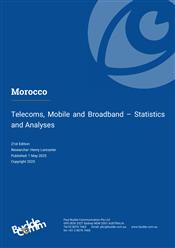Morocco Telecoms Market Report
Telecoms, Mobile and Broadband - Statistics and Analyses

Last updated: 30 Jan 2024 Update History
Report Status: Current
Report Pages: 191
Analyst: Henry Lancaster
Morocco upgrades its telecom ambitions with Digital 2030 strategy
Morocco has one of the more advanced telecommunications sectors in Africa. It has been supported by the government over decades, particularly relating to the country’s digital transformation and the extension of broadband nationally. These measures have gone far to improving internet access. In the fixed-line broadband segment there is considerable investment in fibre. Though fibre accounts for about a third of all fixed broadband connections, it accounts for only about 25 of all internet connections, showing the dominance of the mobile platform.
Other companies have attempted to break into the fixed broadband market but have been repeatedly thwarted by a lack of access to Maroc Telecom’s DSL infrastructure. This situation culminated in Maroc Telecom being fined over MAD3 billion in 2020 for unfair competition practices by restricting local-loop unbundling. The DSL market has opened since then, with Inwi having secured a 17% share of subscribers by late 2023.
Other developments centre on the country’s updated Maroc Digital 2030 digital strategy. As well as a complete digitisation of public services and stimulating the digital economy, the strategy aims to create 300,000 jobs, foster startups in the ICT sector, and increase the number of graduates with digital skills from Moroccan universities and technical colleges. These efforts are supported by Technopark Morocco, which opened its sixth campus in November 2023 and which is planning to have three more in service by the end of 2024. These incubators have supported thousands of businesses and have become central to the government’s efforts to cement Morocco as a hub for technical innovation in the region.
Key developments:
- Helios Investment Partners acquires a majority stake in Maroc Datacentre.
- Technopark Morocco opens its sixth centre, in Essaouira, with three others planned.
- Government sets up the National Commission for Digital Development, a body charged with streamlining administrative processes and improving the country’s digital services.
- Morocco improves ranking in e-governance tables following the digitisation of services.
- Morocco joins with Tanzania to use satellite-based systems to collect data on agricultural yields in areas with no internet coverage.
- Report update includes ITU’s data updates, updated Telecom Maturity Index charts and analyses, regulator’s market data to September 2023, operator data to Q3 2023, recent market developments.
Companies mentioned in this report:
- Maroc Telecom / Itissalatt Al-Maghrib (IAM), Orange Morocco, Inwi (Wana)
Related Reports
- Africa - Fixed Broadband Market - Statistics and Analyses
- Africa - Mobile Infrastructure and Mobile Broadband
- Africa - Mobile Network Operators and MVNOs
- Sierra Leone - Telecoms, Mobile and Broadband - Statistics and Analyses
- Senegal - Telecoms, Mobile and Broadband - Statistics and Analyses
- South Africa - Telecoms, Mobile and Broadband - Statistics and Analyses
- Zambia - Telecoms, Mobile and Broadband - Statistics and Analyses
- Rwanda - Telecoms, Mobile and Broadband - Statistics and Analyses
- Uganda - Telecoms, Mobile and Broadband - Statistics and Analyses
- Egypt - Telecoms, Mobile and Broadband - Statistics and Analyses
Share this Report
TMT Intelligence
A platform to scale your intelligence tasks
Monitor critical insights with our AI-powered Market Intelligence Platform gathering and analyzing intelligence in real time. With AI trained to spot emerging trends and detect new strategic opportunities, our clients use TMT Intelligence to accelerate their growth.
If you want to know more about it, please see:
Research Methodology
BuddeComm's strategic business reports contain a combination of both primary and secondary research statistics, analyses written by our senior analysts supported by a network of experts, industry contacts and researchers from around the world as well as our own scenario forecasts.
For more details, please see:
More than 4,000 customers from 140 countries utilise BuddeComm Research
Are you interested in BuddeComm's Custom Research Service?
Hot Topics
News & Views
Have the latest telecommunications industry news delivered to your inbox by subscribing to BuddeComm's weekly newsletter.